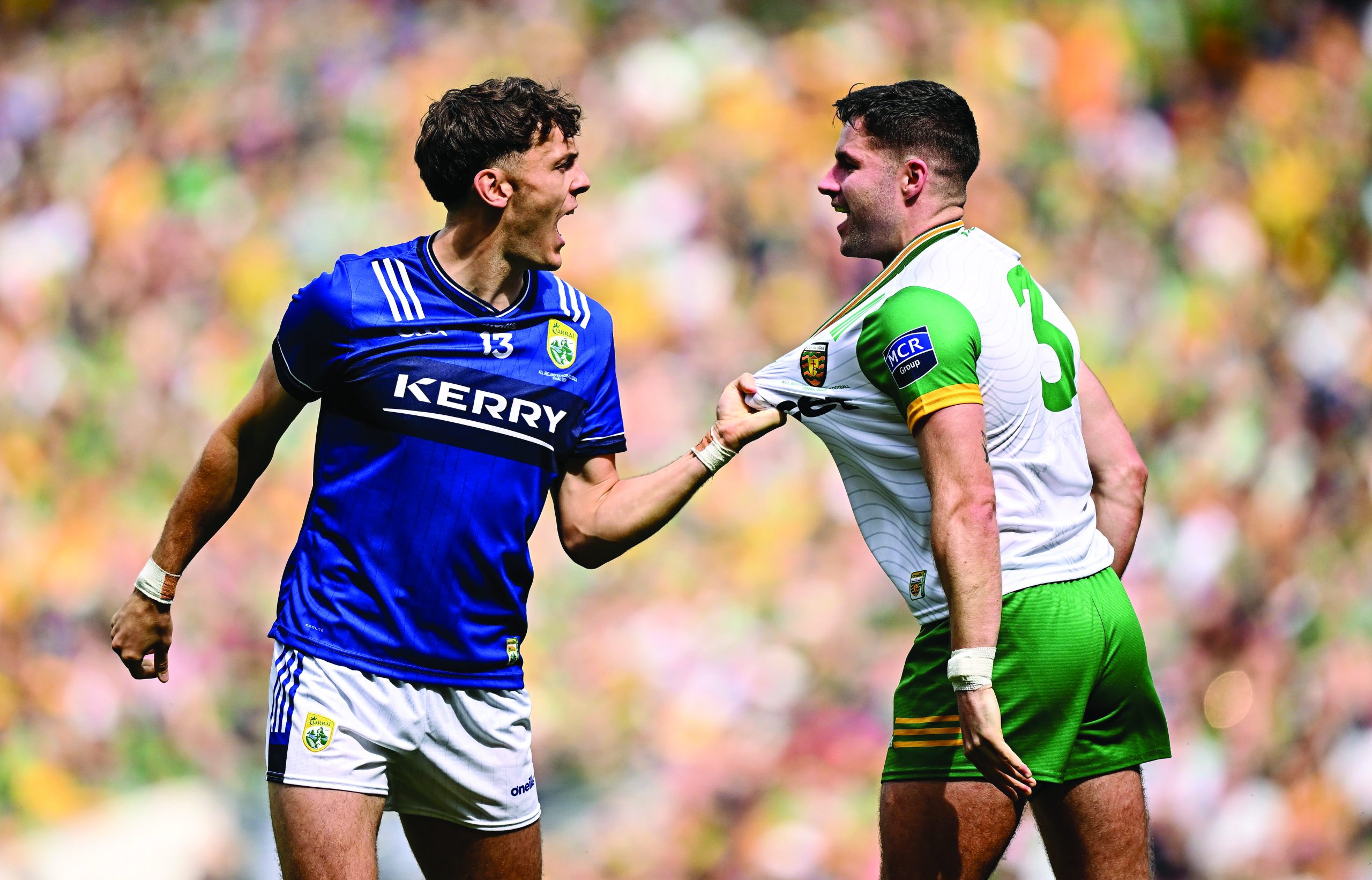Éamonn Fitzmaurice is part of the FRC that have shaped the new version of Gaelic football. After a busy season, their work continues. He spoke with Michael McMullan
Michael McMullan: Éamonn, as a Kerry man, it has been an excellent year but if you put your Kerry hat to one side, I am sure you’re happy with the progress with the new rule enhancements.
Éamonn Fitzmaurice: Absolutely. From a personal perspective, 100 per cent, I was happy. As we said at the start, it was always going to be an interesting season and there was always going to be a bedding in. I always felt myself, depending on what’s adopted by the Special Congress, that it will take a couple of years before we all get to grips with the different nuances and what the different kind of changes mean.
In terms of the games we got, maybe the tail end of the championship, in the games, there was still plenty of quality there, but maybe they weren’t as competitive as some of the games earlier on in the summer.
We got some fantastic games throughout the year, going back to the league and in the championship. I said to yourself earlier on in the year and I remember being on with Paul Rose on the Irish Examiner podcast about the FRC. I was asked what I thought would be a success for the year. I felt that whatever metrics you want to put on it, for me it would be the feeling of going to games and the feeling of the game being in a good place. The feeling of people talking and really enjoying football, coming out of games and talking about it for the week, rather than almost enduring games as we had to do for the last couple of years.
We always had good games, but it did feel at times that we had to endure games. This year, the conversation around football has become way more positive, people have really re-engaged with the game and are going to games in increased numbers and are watching it.
From that point of view, it has been great. It hasn’t been perfect and I don’t think anyone was expecting it to be. I think as a spectacle it has been a very good year and we’ve seen an awful lot of good matches.
Another thing I would have felt is that the players nowadays are better than they ever have been. They’re better conditioned, they’re better skill-wise. I think we’ve seen that this year, we’ve seen them being able to express that. Whereas, possibly in the last few years, it was the system that was dictating how players were playing. This summer, we definitely got to see players expressing themselves a bit, which was good as well.
M McM: It was a busy time getting it up and running, but what did it look like during the year? Would you be meeting as often?
ÉF: It was certainly every fortnight. A lot of the time we met weekly during the league when there was the kind of the establishment phase and the different issues we were presenting and all of that.
Over the summer, it was probably once a fortnight that we were meeting but we kept up the online meetings throughout. We obviously had our own WhatsApp group that we could feed any thoughts into at any stage if we were at games.
We’ve had a couple of in-person meetings and we’ll have a couple more of those now before the Special Congress again.
In fairness to Jim Gavin, he said that from the off, it’s very much a two-year, a two-year gig. The first year, obviously we were coming up with the proposals for a lot of last year. Once the proposals came in then we were monitoring everything this year and again then going back to Special Congress to see what the Association want to make permanent.
M McM: There was a sandbox game in Dublin the week after the All-Ireland final. What have you been looking at that we might see added to your proposals?
ÉF: There are a few additional things that we’ve been looking at. There is the four-point goal which was part of the original proposals and it was rolled back on then before Special Congress.
The second one is an over-and-back rule which is basically like the backcourt in basketball. Once you cross the halfway line that you can’t come back into your own half.
Obviously, there would have to be some kind of an allowance around kick-outs, that if your kick-out was broken back in, so you’d have to have some thought on that.
The idea of that is to encourage the team that’s defending to press out because they know that they have another line that the team can’t go back across. It might encourage teams to press out that bit more.
We’re having a look at the kick-out mark again, just maybe simplifying it more. If you catch a kick-out you either play on as normal and you’re fair game or if you want to claim a mark put up your hand.
We haven’t discussed them in depth ourselves, never mind starting to push them up through the ranks, through all the various bodies before it can eventually get voted on if we decide that there’s merit in any one of those.
So that’s still very much at the kind of the beginning phase of discussions.
M McM: Will there be a regular string of sandbox games in the coming weeks?
ÉF: We’re unsure to be honest because it is very challenging obviously getting games at this time of the year now when all clubs are running.
We have to be cognizant of that. We have to be cognizant as well then that the sandbox games absolutely have their place.
At the end of the day, as we saw with all of the rules, the real road testing is in competition and that’s where you can see them, so we have to bear all of that in mind.
If none of those are proposed, I think we’re still in a pretty good place. We’re duty bound to keep thinking about it and making sure that, with the window that we’ve got, that we’ve really maximized this and that we’ve done as good a job as we possibly can.
When we hand over the reins then that we can walk away from it and say that we left nothing on the table or there was nothing that we didn’t discuss or there was nothing we didn’t explore to see what has helped the game.
M McM: I read a survey and there were 10 more goals in the championship than in 2024. Seven less in Ulster, but 15 more in the All-Ireland knock-out. Does that mean that a four-point goal isn’t as important?
ÉF: I was even interested to hear Shane Ryan talking about it before the All-Ireland final. He’s had way more shots to save this year. As you mentioned, the number of goals has been up marginally across the board, but in general the number of goals has been up.
The number of saves that ‘keepers have had to make has been up as well. So, there is that side of it as well, that the ‘keepers have been asked to do more. Back to the point that I was making earlier on, we’re seeing how good a lot of the goalkeepers are at shot stopping, and we’re just getting to see more of their skill sets. That particular skill set, that maybe we wouldn’t have seen as much over the last couple of years. So we’ve to balance all of that up.
The argument against the four-point goal, of course, is that if a team get a couple of goals at the start of the game, could it mean that the game is effectively over at half-time? But the flip argument of that then is that if you get a goal back then with the four-pointer, it can have a big flip in the scoreboard straight away.
We saw it all year long, but particularly in league games, that the scoring can be pegged back, big gaps can be pegged back in the second half of games.
There are all those different angles to discuss. When we get together in person and we’ve to kind of start nailing our colours to the mast, I’m sure all of those points will be thrown out on the table.
M McM: Ciarán McKeever had a piece with us last week about a three v three game to promote going for goals. With how Kerry approached Donegal’s zonal defence, do you think there will be a change in the focus with coaching with the new enhancements?
ÉF: I think there will. Look, to be fair to the inter-county coaches this year, there was some amount thrown at them early in the year. The thing about it is that when you’re in charge of an inter-county team, you need to start getting results from the off, so you’re going to try and come up with a system that you’re embracing the new rules obviously, but at the same time, you’re trying to get to a place very quickly that you can have consistency of performance.
I think to be fair to the inter-county teams, they did that this year, but I do think we’ll see kind of innovation and progress in the club season.
By the time it comes around to next season, certainly in two seasons time, if a lot of the changes are adopted permanently, I definitely see a shift in coaching.
I think there will be more one-on-one defending. I think backs will get more comfortable with one-on-one defending as the principles of that three-in-three game you mentioned. You’ll get more forwards trying to beat their men in one-on-one situations, trying to open up goal chances.
Obviously, the high ball, the catching the kick out, the breaking ball, a lot of that had come back in by the end of the championship anyway. You could see huge progression from the start of the year. I do expect it to shift and I think it had started to shift during the season, but we all have to appreciate how challenging it has been in the inter-county set-up where the games are coming so thick and fast.
It wasn’t like back 10 years ago where you might have four or five weeks between games and you’d actually have a chance to work on specific tactical things, where you could do four or five sessions on it. The lads just didn’t have the time to be doing that this year.
So, I do expect a shift. I think it’ll be a positive shift because look there’s great people involved in the game up and down the country at club level, but especially at inter-county level. There are very able and capable people, and I think they’ll sit back and they’ll look at the season. They’ll say this clearly works against a certain type of opposition. If you want to go all the way and want to win the All-Ireland, maybe you have to do something slightly differently, and I think the game will be better for next year because of that.
Receive quality journalism wherever you are, on any device. Keep up to date from the comfort of your own home with a digital subscription.
Any time | Any place | Anywhere













